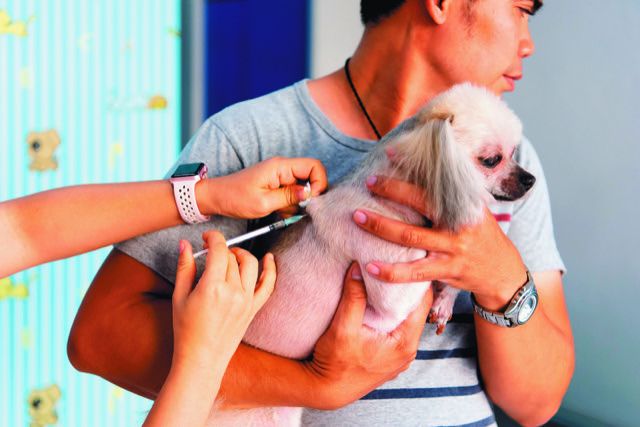In developing countries where vaccination against rabies is not readily available for dogs, thousands of people die of rabies every year because the disease can be transmitted from canines to humans. In the U.S., only a handful of people contract rabies from their dogs each year. But that could change.
More than half of Americans with dogs believe that vaccines administered to their pets may be unsafe, are ineffective, and/or are unnecessary, according to a survey of 2,200 people across the country conducted by researchers at Boston University’s School of Public Health. The researchers believe there may be a spillover in attitude from people who buy into misinformation regarding the safety of vaccines for people. Indeed, many of those who have what the researchers call canine vaccine hesitancy believe dogs who receive vaccines can develop cognitive issues like autism, just as some people believe that children can develop autism from vaccines that inoculate against measles, mumps, and rubella.
Other research, included in the references for this study, suggests that unfounded beliefs about the safety of Covid-19 shots may be fueling skepticism about vaccines. If the skepticism persists or increases, both dogs and the people who take care of them could be in trouble. Once fewer than 70 percent of a country’s dogs are vaccinated against rabies, the risk for that disease increases significantly, both in dogs and people. And rabies is virtually always fatal.
Veterinarians at special risk
When you don’t vaccinate your dog, the scientists point out, you put veterinarians and their staff at particular risk. Those healthcare professionals come into contact with many more dogs than the general population, and some of those animals might act aggressively in their presence. Thus, veterinary workers have a greater chance than the average person of catching rabies or perhaps another infectious disease from a pet. “This may invoke a heightened sense of stress” for veterinary team members, the investigators say, likely contributing to veterinary burnout. In other words, not vaccinating your dog could potentially work to make veterinary care less accessible than it is currently.
Don’t fall prey to canine vaccine hesitancy
Sadly, 22 percent of those surveyed by the Boston University team said that the risks posed by possible side effects of vaccines outweigh their benefits That’s not true. More than one in three households in the U.S. has a dog, and tens of millions of pets receive inoculations every single year without any problems whatsoever. You shouldn’t hesitate to have your dog receive the vaccinations your veteri-
narian recommends.
It’s not that dogs never experience an adverse reaction to a vaccine; they sometimes do. But the most common reactions are mild and short-lived, dissipating on their own within one to two days. They include discomfort and swelling at the vaccination site, mild fever, and decreased appetite and activity.
More serious reactions, which occur even less often, include vomiting or diarrhea, itching, swelling around the face, and respiratory issues. But even these rare occurrences are less serious than death from something like rabies. That’s in part why the American Animal Hospital Association calls vaccinations “a cornerstone of canine preventive healthcare.” Canine inoculations are part of human preventive healthcare, too.





